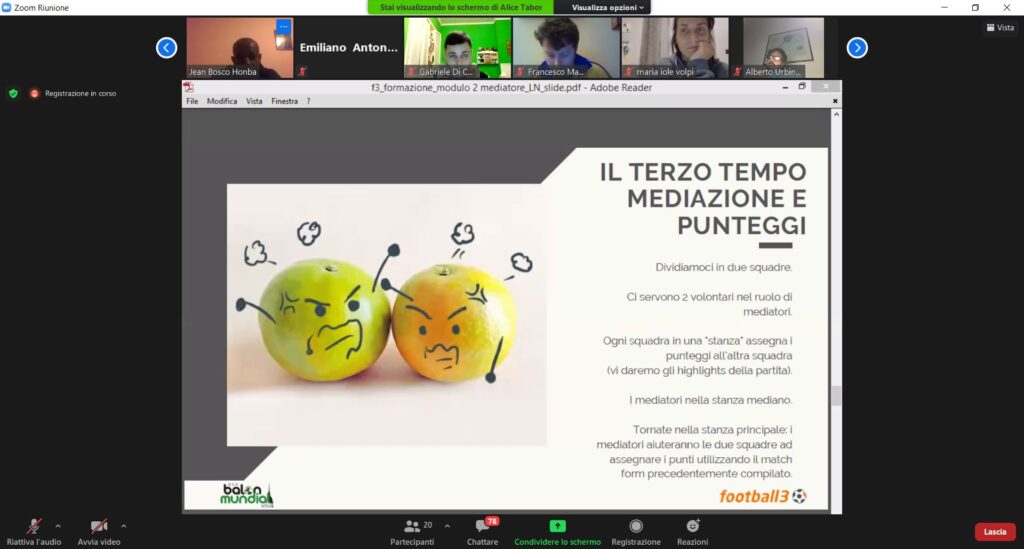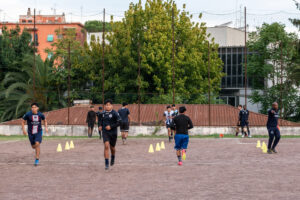[:it]
Anche quella di Liberi Nantes tra le sei realtà raccontate nel web-reportage Nessuno In Fuorigioco, nato da un’idea di Guido Montana e Aniello Luciano.
Sei storie vere di integrazione legate al mondo del calcio in cui il grande impegno, individuale e collettivo, dei soggetti interessati contrasta positivamente le difficoltà sociali e i problemi di emarginazione.
Lo racconta per noi Mattia Bagnato:
C’è chi da anni si batte per aiutare i migranti sbarcati in Italia. Usa il calcio come strumento d’integrazione, abbattendo la logica dei muri a pallonate. È il mondo dell’associazionismo raccontato nel web reportage prodotto da Mondofutbol.com
Un giorno una giornalista chiese alla teologa tedesca Dorothee Solle: “Come spiegherebbe la felicità ad un bambino?”. Lei rispose: “Non glielo spiegherei”. “Gli darei un pallone per farlo giocare”. La felicità, quella a cui si riferiva la teologa, puoi vederla nei volti color ebano immortalati nel web reportage Nessuno in fuorigioco. Una gioia di vivere autentica e contagiosa.
Capace di cancellare la sofferenza e le violenza delle guerra, per farti ritornare ragazzino. È tutta qui, si fa per dire, la potenza del calcio. Nascosta, ma non troppo, nelle pozze di un campo di periferia o nell’impegno irriducibile dei volontari della Liberi Nantes, dell’Atletico Brigante o dell’Atletico diritti e chi più ne ha più ne metta. Sono decine, infatti, le squadre nate dalla volontà d’integrazione e solidarietà.
Semplici squadre di calcio, all’apparenza. Progetti sociali enormi, invece, che superano i confini e scavalcano i muri. Come la No borders cup, triangolare benefico organizzato a Pietrelcina dall’Atletico brigante lo scorso 3 gennaio. Un modo per ribadire, se ancora ce ne fosse bisogno, che siamo tutti fratelli su questa terra. Che il crogiolo delle razze è una ricchezza e che il colore della pelle, la religione e la nazionalità sono solo dei dettagli, che non fanno di te un uomo migliore o peggiore.
È il cuore a fare la differenza e questi ragazzi ne hanno uno davvero grande. Così grande, da spalare la neve che ostruisce le strade o il fango dopo l’ennesima alluvione. Poco importano, le barricate alzate per non farli scendere dai pullman o i discorsi razzisti che gli scarichiamo addosso.
“Siamo noi il futuro dell’Italia”, dice Henry, il giovane allenatore burkinabè della Young Italy.
Dopo una traversata estenuante durata mesi, infatti, sono sbarcati in Italia e qui vogliono rimanere. Per integrarsi e dare il loro contributo ad un paese sempre più “vecchio”. Nel viaggio hanno perso amici e parenti, inghiottiti dalla profondità degli abissi. Giocano a calcio per dimenticare, racconta commosso Abdul. Per rimuovere dalla mente le immagini di quei corpi inghiottiti dal mare. Ma è impossibile farlo. Come nei peggiori incubi, infatti, le immagini di quei tragici momenti continuano a tormentarti di notte. Allora, non rimane che imparare a conviverci con quei sogni. Sperando, che chi partirà dopo di te non debba morire nel tentativo di raggiungere la felicità.
Nessuno in fuorigioco è anche, e soprattutto, un racconto di speranza. Di giovani migranti tolti dall’emarginazione e dalle grinfie della criminalità. Ma è anche un escamotage per “ripulire” l’immagine di uno sport troppo spesso ostaggio di violenti e affaristi senza scrupoli, rimportandolo nella dimensione che merita. Quella di ponte tra culture e mondi differenti. Su un campo di calcio siamo tutti uguali, si legge in apertura del web reportage: “Vivere nel mondo di oggi ed essere contro l’uguaglianza per motivi di razza o colore è come vivere in Alaska ed essere contro la neve”.
Così, può accadere che etnie da secoli in lotta si scoprano compagni di squadra, pronti a “combattere” insieme per segnare un goal. È il caso della Lions Caserta, 4 squadre di cui una femminile e una dozzina di nazionalità. Dall’Asia all’Africa passando per l’America Latina.
Il viaggio nel quale queste squadre di calcio si sono imbarcate, però, è molto più lungo di quello che si può immaginare. Abbraccia una miriade di contesti sociali e svariate problematiche. L’Atletico Diritti ne è un esempio inequivocabile. Una polisportiva nata dall’Associazione Progetto Antigone e patrocinata dall’Università di Roma Tre. Da qualche anno è riuscita a coinvolgere studenti, migranti detenuti ed ex detenuti. Un’eccezionale modello di integrazione, secondo Susanna Marietti Presidente della Polisportiva. “Una squadra che si apre a tante esperienze e a tanti vissuti diversi”.
“È la conoscenza che fa superare gli stereotipi, è la conoscenza che fa superare i pregiudizi”, conclude ancora Susanna Marietti. Basta andare a Parma per rendersene conto, a “casa” dell’ASD Scanderberg. Qui il calcio parla Gegë o Toskë, i due dialetti di cui si compone la lingua albanese.
La mente corre veloce a quelle enormi barche strapiene di gente che a metà degli anni ’90 occupavano tutti i telegiornali. Ne hanno fatta molta di strada quelle persone. Con riservatezza, scontrandosi con vergogni luoghi comuni che li volevano nient’altro che ladri o scippatori. Oggi, la comunità albanese sembra essersi perfettamente integrata. Anche grazie all’impegno di chi, come Gigi Arpino capitano della squadra, si è sempre battuto affinché fosse la conoscenza a dettare le regole del gioco.
Il calcio che unisce invece che dividere. Tutto questo, mentre si fa un gran parlare di curve vuote, di tessere del tifoso e di stadi di proprietà. Tempo perso, quando intorno a noi c’è un universo fatto d’impegno sociale, di lotta al razzismo e al pregiudizio. Un mondo quasi sconosciuto, in cui la contrapposizione ‘noi e loro’ sparisce per lasciare il passo all’inclusione. Uomini e donne salpati da terre lontane, in balia di un sistema che non smette di ricordargli che non c’è posto per loro, hanno trovato il loro angolo di paradiso. Un spazio, dove poter ricominciare a sognare un futuro migliore.[:en]
Liberi Nantes is one of the six stories told in the web programme Nessuno In Fuorigioco [Nobody Offside], which is based on an idea of Guido Montana and Aniello Luciano.
Six true stories of integration from the world of football in which great commitment of the people involved, both individual and collective, provides a positive contrast with the social difficulties and problems of marginalisation.
Mattia Bagnato tells the story:
There are those who have worked for years to help the migrants who have landed in Italy, who use football as an instrument of integration, knocking down the logic of barriers with a football. It is a world of associations told in the web programme produced by Mondofutbol.com.
One day a journalist asked the German theologian Dorothee Solle: “How would you explain happiness to a child?” She replied: “I wouldn’t explain it. I would give the child a ball to play with”. The kind of happiness the theologian referred to, you can see in the ebony-coloured faces immortalised in the web programme Nessuno in fuorigioco. An authentic and contagious joy of living.
It can cancel the suffering and violence of war, and make you feel like a child again. This is the power of football. Hidden, but not too much, in the puddles of a pitch on the outskirts of town, or in the unbreakable commitment of the volunteers of Liberi Nantes, of Aletico Brigante or of Atletico Diritti, and so on. There are dozens of teams born from the desire for integration and solidarity.
Simple football teams, on the face of it. Instead they are huge social projects, which overcome barriers and scale walls. Like the No Borders Cup, a three-team charitable event organised at Pietrelcina by Atletico Brigante on 3 January. A way of confirming, if it were still necessary, that we are all brothers and sisters on this earth. That the melting pot of races is a source of wealth and that the colour of one’s skin, or religion or nationality, are merely details that don’t make you a better or worse person.
It is the heart which makes the difference and these young people really have a big heart. So big, that they will shovel away the snow which is blocking the roads or the mud after the latest landslide. The barricades erected to stop them getting of the bus or the racist abuse which gets thrown at them matter little.
“We are the future of Italy”, says Henry, the young Burkinabe coach of the Young Italy team.
After a gruelling crossing which lasted months, they have landed in Italy and here they want to stay.
To integrate and give their contribution to a country which is getting older and older. During the journey they lost friends and relatives, swallowed by the darkness of the abyss. They play football to forget, a tearful Abdul tells us. To get the images of those bodies swallowed up by the sea out of their heads. But it’s impossible to do so. As in the worst nightmares, the images of those tragic moments return at night to torment them. There is nothing left to do but learn to live with those dreams. Hoping that whoever follows you will not die in the attempt to find happiness.
Nessuno in fuorigioco is also, and especially, a story of hope. Of young migrants removed from their marginalisation and taken from the clutches of crime. But it’s also a ploy to “clean up” the image of a sport which has too often been hostage to the violent, to unscrupulous money-makers, returning it to the dimension it deserves. That of being a bridge between cultures and different worlds. We are all equal on a football pitch is what we read at the opening of the web report: “To live anywhere in the world today and be against equality because of race or color is like living in Alaska and being against snow.”
In this way, it can happen that races which for centuries have been fighting, find themselves team mates, ready to “fight” together to score a goal. This is the case of Lions Caserta, which has four teams, including a women’s team, and a dozen nationalities. From Asia to Africa, passing through Latin America.
The journey these teams have undertaken, however, is a lot longer than one could imagine. It embraces myriad social contexts and multiple problems. Atletico Diritti is an unequivocal example.
A multi-sports club born from the Association Progetto Antigone with the patronage of the University of Roma Tre. For a few years, it has manged to involve students, detained migrants and formerly detained migrants. An exceptional model of integration, according to Susanna Marietti, the president of the club. “A team which has opened itself up to many experiences and many different lives lived”.
“Knowledge is what overcomes stereotypes, and knowledge overcomes prejudices”, Susanna Marietti concludes. To see this, you only have to go to Parma, to the “home” of ASD Scanderberg.
Here, two dialects of the Albanian language – Gegë and Toskë – are spoken.
The mind races to those huge boats full of people that we have seen on the news since the middle of the 1990s. Those people have since gone a long way. With reserve, coming up against the kind of commonplaces that see them only as thieves or pickpockets. Today, if the Albanian community seems to be perfectly integrated, this is also due to people like Gigi Arpino, team captain, who has always fought to make knowledge dictate the rules of play.
Football unites rather than divides. All the time, we hear a lot about empty stadiums, fan ID cards, and stadium ownership. It’s all time wasted when around us there is a universe made up of social commitment, of the struggle against racism and prejudice. A largely unknown world, in which the opposition of ‘them and us’ dissolves to make way for inclusiveness. Men and women who have set sail from distant lands, at the mercy of a system which never ceases to remind them that there is no room for them, have found their corner of paradise. A space where they can start to dream again of a better future.[:]




